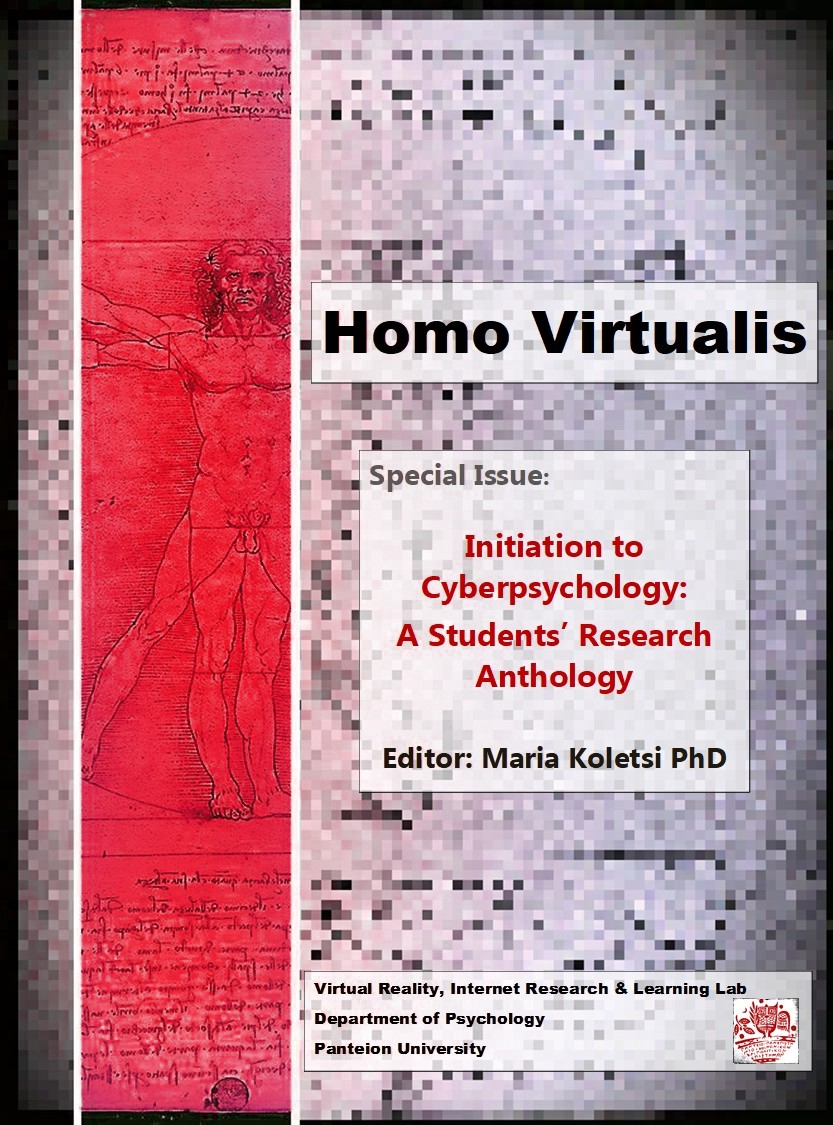Κυβερνοψυχολογία: Από τον Homo Sapiens στον Homo Virtualis

Περίληψη
Το αντικείμενο της Κυβερνοψυχολογίας αποτελεί ένα νέο επιστημονικό πεδίο στο χώρο των Κοινωνικών Επιστημών και ειδικότερα της Ψυχολογίας. Αποτελεί το πεδίο σύγκλισης της επιστήμης της Κυβερνητικής με την Ψυχολογία, μέσα από τον κοινό άξονα μελέτης του ελέγχου και της αντιληπτικής λειτουργίας του ατόμου. Η ανθρώπινη συμπεριφορά και η σχέση της με τις τεχνολογίες πληροφορίας και επικοινωνίας, η ενσωμάτωσή τους στην καθημερινή ζωή, η διαχείριση, επίλυση αλλά και η δημιουργία προβλημάτων, καθιστούν την Κυβερνοψυχολογία έναν νέο κλάδο, που καλείται να συμβάλλει στην γνώση της επιστήμης για την εξέλιξη του ανθρώπου. Ο Homo Virtualis είναι ένας κυβερνητικός οργανισμός που αποπειράται να διατηρήσει και να ενισχύσει τον έλεγχο στον εαυτό του και στο περιβάλλον του, μέσα από γνωστικές και συναισθηματικές διεργασίες. Διεργασίες που επικουρούνται από τεχνολογίες παραγωγής και οργάνωσης της ανθρώπινης συμπεριφοράς. Το παρόν άρθρο αποτελεί μια εισαγωγή στην οντολογική βάση της Κυβερνητικής Ψυχολογίας, στα πλαίσια έκδοσης του ειδικού τεύχους του περιοδικού που είναι αφιερωμένο στις προπτυχιακές εργασίες φοιτητριών και φοιτητών του Τμήματος Ψυχολογίας, του Παντείου Πανεπιστημίου Κοινωνικών και Πολιτικών Επιστημών. Οι εργασίες που παρουσιάζονται στο ειδικό τεύχος εκπονήθηκαν στα πλαίσια του μαθήματος «Κυβερνοψυχολογία», το οποίο διδάχθηκε, για πρώτη φορά, ως υποχρεωτικό, στο εαρινό εξάμηνο σπουδών του ακαδημαϊκού έτους 2020-2021.
Λεπτομέρειες άρθρου
- Πώς να δημιουργήσετε Αναφορές
-
Κωλέτση Μ. (2022). Κυβερνοψυχολογία: Από τον Homo Sapiens στον Homo Virtualis. Homo Virtualis, 5(1), 1–11. https://doi.org/10.12681/homvir.30312
- Ενότητα
- Σημείωμα Έκδοσης

Αυτή η εργασία είναι αδειοδοτημένη υπό το CC Αναφορά Δημιουργού 4.0.
Οι συγγραφείς των άρθρων που δημοσιεύονται στο περιοδικό διατηρούν τα δικαιώματα πνευματικής ιδιοκτησίας επί των άρθρων τους, δίνοντας στο περιοδικό το δικαίωμα της πρώτης δημοσίευσης.
Άρθρα που δημοσιεύονται στο περιοδικό διατίθενται με άδεια Creative Commons 4.0 και σύμφωνα με την άδεια μπορούν να χρησιμοποιούνται ελεύθερα, με αναφορά στο/στη συγγραφέα και στην πρώτη δημοσίευση για μη κερδοσκοπικούς σκοπούς.
Οι συγγραφείς μπορούν να καταθέσουν το άρθρο σε ιδρυματικό ή άλλο αποθετήριο ή/και να το δημοσιεύσουν σε άλλη έκδοση, με υποχρεωτική την αναφορά πρώτης δημοσίευσης στο περιοδικό
Οι συγγραφείς ενθαρρύνονται να καταθέσουν σε αποθετήριο ή να δημοσιεύσουν την εργασία τους στο διαδίκτυο πριν ή κατά τη διαδικασία υποβολής και αξιολόγησής της.


